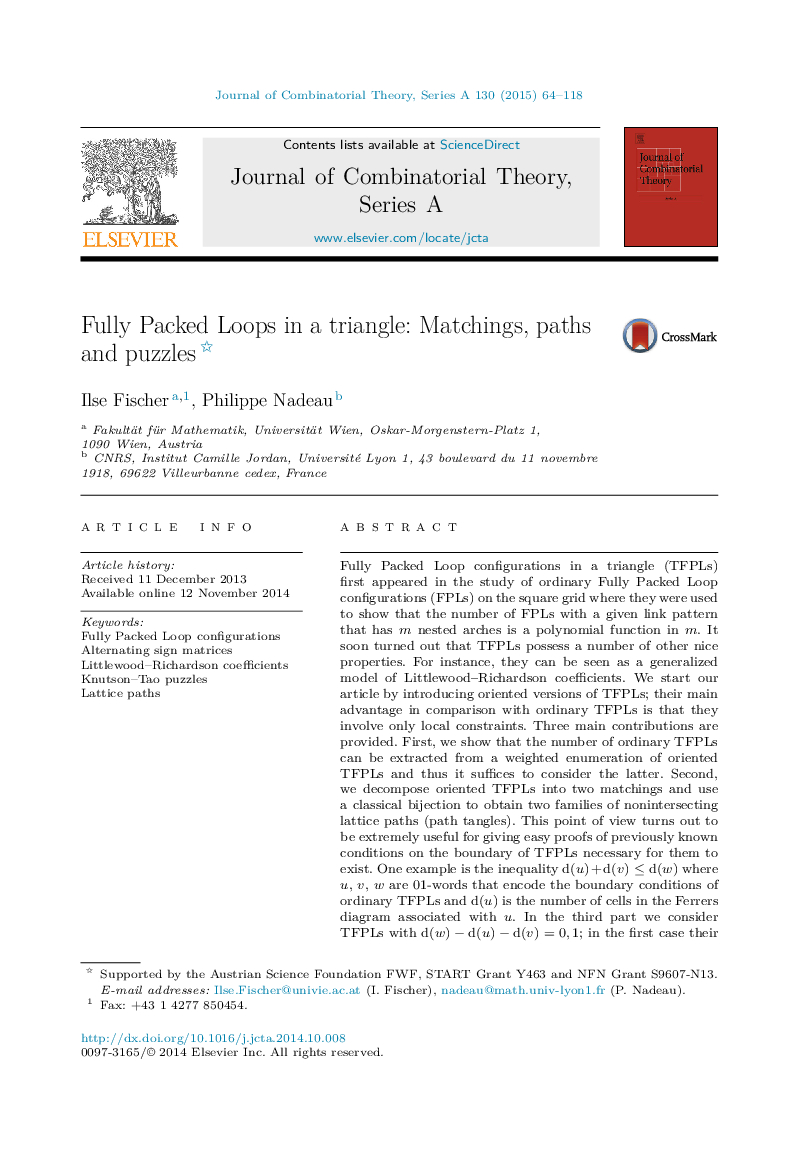| کد مقاله | کد نشریه | سال انتشار | مقاله انگلیسی | نسخه تمام متن |
|---|---|---|---|---|
| 4655238 | 1632942 | 2015 | 55 صفحه PDF | دانلود رایگان |
عنوان انگلیسی مقاله ISI
Fully Packed Loops in a triangle: Matchings, paths and puzzles
ترجمه فارسی عنوان
حلقه های کاملا بسته بندی شده در یک مثلث: تطبیق، مسیر و پازل
دانلود مقاله + سفارش ترجمه
دانلود مقاله ISI انگلیسی
رایگان برای ایرانیان
کلمات کلیدی
موضوعات مرتبط
مهندسی و علوم پایه
ریاضیات
ریاضیات گسسته و ترکیبات
چکیده انگلیسی
Fully Packed Loop configurations in a triangle (TFPLs) first appeared in the study of ordinary Fully Packed Loop configurations (FPLs) on the square grid where they were used to show that the number of FPLs with a given link pattern that has m nested arches is a polynomial function in m. It soon turned out that TFPLs possess a number of other nice properties. For instance, they can be seen as a generalized model of Littlewood-Richardson coefficients. We start our article by introducing oriented versions of TFPLs; their main advantage in comparison with ordinary TFPLs is that they involve only local constraints. Three main contributions are provided. First, we show that the number of ordinary TFPLs can be extracted from a weighted enumeration of oriented TFPLs and thus it suffices to consider the latter. Second, we decompose oriented TFPLs into two matchings and use a classical bijection to obtain two families of nonintersecting lattice paths (path tangles). This point of view turns out to be extremely useful for giving easy proofs of previously known conditions on the boundary of TFPLs necessary for them to exist. One example is the inequality d(u)+d(v)â¤d(w) where u, v, w are 01-words that encode the boundary conditions of ordinary TFPLs and d(u) is the number of cells in the Ferrers diagram associated with u. In the third part we consider TFPLs with d(w)âd(u)âd(v)=0,1; in the first case their numbers are given by Littlewood-Richardson coefficients, but also in the second case we provide formulas that are in terms of Littlewood-Richardson coefficients. The proofs of these formulas are of a purely combinatorial nature.
ناشر
Database: Elsevier - ScienceDirect (ساینس دایرکت)
Journal: Journal of Combinatorial Theory, Series A - Volume 130, February 2015, Pages 64-118
Journal: Journal of Combinatorial Theory, Series A - Volume 130, February 2015, Pages 64-118
نویسندگان
Ilse Fischer, Philippe Nadeau,
